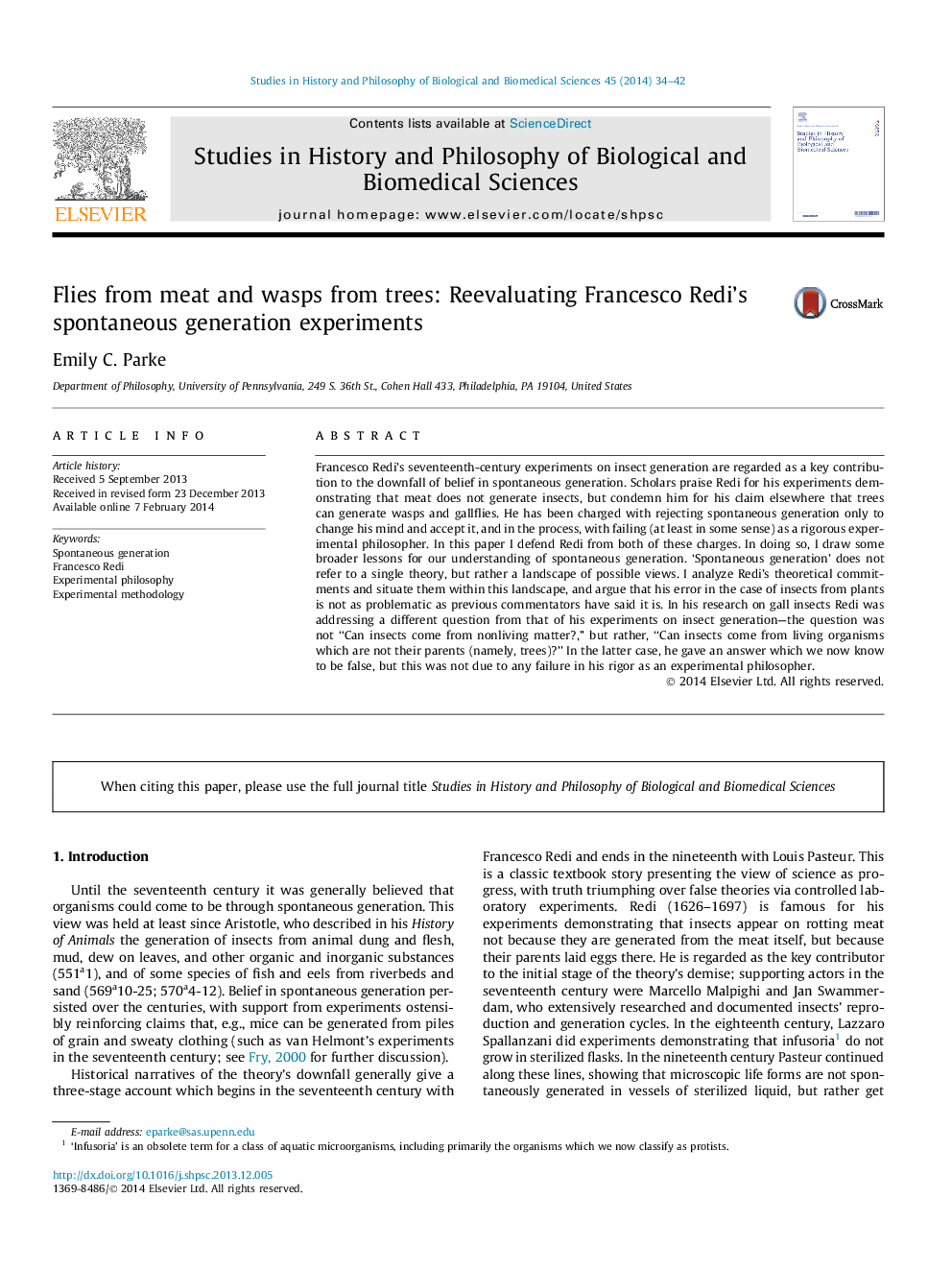| کد مقاله | کد نشریه | سال انتشار | مقاله انگلیسی | نسخه تمام متن |
|---|---|---|---|---|
| 7552728 | 1490522 | 2014 | 9 صفحه PDF | دانلود رایگان |
عنوان انگلیسی مقاله ISI
Flies from meat and wasps from trees: Reevaluating Francesco Redi's spontaneous generation experiments
ترجمه فارسی عنوان
مگس از گوشت و زنبورها از درختان: تجدید ارزیابی آزمایشهای خودانگیخته فرانچسکو ردی
دانلود مقاله + سفارش ترجمه
دانلود مقاله ISI انگلیسی
رایگان برای ایرانیان
کلمات کلیدی
نسل خودمونی، فرانچسکو ردی، فلسفه تجربی، روش تجربی،
ترجمه چکیده
آزمایشات قرن هفدهم فرانچسکو ردی درباره نسل حشرات به عنوان یک کلیدی برای کاهش اعتقاد به نسل خودمحور در نظر گرفته شده است. محققان ردی را برای آزمایش هایش تحسین می کنند و نشان می دهند که گوشت حشرات را تولید نمی کند، اما او را برای ادعای خود در جای دیگر محکوم می کند که درختان می توانند زنبورها و زنبورها را تولید کنند. او متهم به رد نسل خود به خود شده است تا ذهن خود را تغییر دهد و آن را پذیرفته و در روند، با شکست (حداقل به برخی از معانی) به عنوان یک فیلسوف تجربی سختگیر. در این مقاله من از ردی از هر دو این اتهام دفاع می کنم. در انجام این کار، من برای یادگیری نسل خود به خود درس هایی مفصل تر می آورم. "نسل خود به خود" به یک نظریه واحد اشاره نمی کند، بلکه یک چشم انداز دیدگاه های احتمالی است. من تعهدات نظری ردی را تجزیه و تحلیل می کنم و آنها را در این چشم انداز قرار می دهم و استدلال می کنم که خطای او در مورد حشرات از گیاهان، همانطور که مفسران قبلی گفته اند، مشکل ساز نیستند. در تحقیق خود در مورد حشرات گلاب، ردی به سوال دیگری از آزمایشاتش در مورد نسل حشرات پاسخ داد. سوال این بود آیا حشرات از ماده غیر زنده می آیند؟ اما حقیقت این است که آیا حشرات از موجودات زنده که والدینشان (یعنی درختان) نیستند، می آیند؟ در مورد دوم، او پاسخی را که اکنون می دانیم اشتباه است، پاسخ داد، اما این به دلیل شکست در سختی او به عنوان فیلسوف آزمایشی نبود.
موضوعات مرتبط
علوم زیستی و بیوفناوری
علوم کشاورزی و بیولوژیک
علوم کشاورزی و بیولوژیک (عمومی)
چکیده انگلیسی
Francesco Redi's seventeenth-century experiments on insect generation are regarded as a key contribution to the downfall of belief in spontaneous generation. Scholars praise Redi for his experiments demonstrating that meat does not generate insects, but condemn him for his claim elsewhere that trees can generate wasps and gallflies. He has been charged with rejecting spontaneous generation only to change his mind and accept it, and in the process, with failing (at least in some sense) as a rigorous experimental philosopher. In this paper I defend Redi from both of these charges. In doing so, I draw some broader lessons for our understanding of spontaneous generation. 'Spontaneous generation' does not refer to a single theory, but rather a landscape of possible views. I analyze Redi's theoretical commitments and situate them within this landscape, and argue that his error in the case of insects from plants is not as problematic as previous commentators have said it is. In his research on gall insects Redi was addressing a different question from that of his experiments on insect generation-the question was not “Can insects come from nonliving matter?,” but rather, “Can insects come from living organisms which are not their parents (namely, trees)?” In the latter case, he gave an answer which we now know to be false, but this was not due to any failure in his rigor as an experimental philosopher.
ناشر
Database: Elsevier - ScienceDirect (ساینس دایرکت)
Journal: Studies in History and Philosophy of Science Part C: Studies in History and Philosophy of Biological and Biomedical Sciences - Volume 45, March 2014, Pages 34-42
Journal: Studies in History and Philosophy of Science Part C: Studies in History and Philosophy of Biological and Biomedical Sciences - Volume 45, March 2014, Pages 34-42
نویسندگان
Emily C. Parke,
